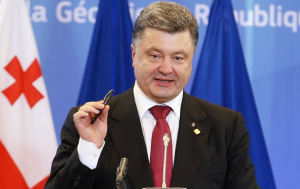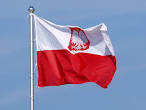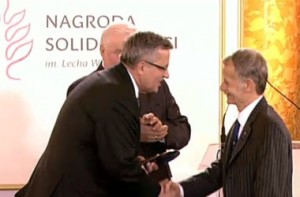Archive for June, 2014
Ukrainian President Petro Poroshenko in Brussels signed the Association Agreement with the European Union. The signing is a milestone. Whether history records June 27 as Ukraine’s “most important day” since it regained independence in 1991—as Mr. Poroshenko suggested—remains to be seen. Much depends on implementation of the agreement. 
The economic pact comes months after deadly protests broke out this winter when then-Ukrainian president Viktor Yanukovych — ousted by demonstrators in February — decided not to sign the trade deal under pressure from Moscow.
Georgia and Moldova also signed association agreements with the EU in a move opposed by Russia. Georgia has already lost chunks of its territory and Black Sea coast to rebels backed by Russia after a brief war with Russia in 2008.
“There will undoubtedly be serious consequences for Ukraine and Moldova’s signing,” Grigory Karasin, Russia’s deputy foreign minister, said.
The Association Agreement can be a game-changer for Ukraine. It includes a deep and comprehensive free trade arrangement (DCFTA) that will open much of the European market to Ukrainian exports. Implementation of the agreement will not only bring Ukraine’s trade and customs rules into conformity with EU standards, it will help the country draw closer to EU democratic norms and “Europeanize” other Ukrainian regulatory regimes.
The Association Agreement lacks a membership perspective
For the European Union, signature of the association agreement with Ukraine (as well as signature of similar pacts with Georgia and Moldova) represents a significant step forward in its Eastern Partnership policy.
For the Kremlin, signature of the Ukraine-EU association agreement represents a setback. Vladimir Putin last December offered $15 billion in loans, with no overt strings attached, and a huge gas price cut to turn Ukraine away from signing.
1. Гарантии безопасности для всех участников переговоров.
2. Освобождение от уголовной ответственности тех, кто сложил оружие и не совершил тяжких преступлений.
3. Освобождение заложников.
4. Создание 10 км буферной зоны на российско-украинской государственной границе. Вывод незаконных вооруженных формирований.
5. Гарантированный коридор для выхода российских и украинских наемников.
6. Разоружение.
7. Создание в структуре МВД подразделений для осуществления совместного патрулирования.
8. Освобождение незаконно удерживаемых административных зданий в Донецкой и Луганской областях.
9. Возобновление деятельности местных органов власти.
10. Обновление центрального теле- и радиовещания в Донецкой и Луганской областях.
11. Децентрализация власти (путем избрания исполкомов, защита русского языка, проект изменений в Конституцию).
12. Согласование губернаторов до выборов с представителями Донбасса (при условии согласования единой кандидатуры, при разногласиях – решение принимает Президент).
13. Досрочные местные и парламентские выборы.
14. Программа создания рабочих мест в регионе.
15. Восстановление объектов промышленности и социальной инфраструктуры
Враги и друзья России.
20 Jun 2014Опрос Левада-центра 23-26 мая 2014 г., данные Фридом Хауза и МВФ.
Таблица 1. КАКИЕ ПЯТЬ СТРАН ВЫ НАЗВАЛИ БЫ НАИБОЛЕЕ НЕДРУЖЕСТВЕННО, ВРАЖДЕБНО НАСТРОЕННЫМИ ПО ОТНОШЕНИЮ К РОССИИ? (несколько вариантов ответа; ответы ранжированы по последнему замеру)
| Страны | Процент полученных голосов, 2014 | Индекс политической свободы, 2014 | ВВП на душу населения, дол. по ППС, 2013 | |
| 1 | США | 69 | 92 | 53101 |
| 2 | Украина | 30 | 55 | 7423 |
| 3 | Литва | 24 | 90 | 22747 |
| 4 | Латвия | 23 | 84 | 19120 |
| 5 | Эстония | 21 | 95 | 23144 |
| 6 | Грузия | 19 | 60 | 6145 |
| 7 | Великобритания | 18 | 97 | 37307 |
| В среднем (среднее арифметическое) | 82 | 24141 |
Таблица 2. НАЗОВИТЕ ПЯТЬ СТРАН, КОТОРЫЕ ВЫ МОГЛИ БЫ НАЗВАТЬ НАИБОЛЕЕ БЛИЗКИМИ ДРУЗЬЯМИ, СОЮЗНИКАМИ РОССИИ? (несколько вариантов ответа; ответы ранжированы по последнему замеру)
| Страны | Процент полученных голосов, 2014 | Индекс политической свободы, 2014 | ВВП на душу населения, дол. по ППС, 2013 | |
| 1 | Беларусь | 51 | 14 | 15753 |
| 2 | Китай | 40 | 17 | 9844 |
| 3 | Казахстан | 37 | 25 | 14391 |
| 4 | Армения | 15 | 43 | 6191 |
| 5 | Индия | 13 | 77 | 4077 |
| 6 | Куба | 10 | 11 | 5008 |
| 7 | Азербайджан | 9 | 22 | 11044 |
| В среднем (среднее арифметическое) | 30 | 9473 |
Источники:
http://www.levada.ru/05-06-2014/otnoshen
http://www.freedomhouse.org/report/freed
http://www.imf.org/external/pubs/ft/weo/2
Ровно пять лет назад, в мае 2009 г., Левада-центр проводил аналогичное исследование.
Какие изменения случились в составах «врагов» и «друзей» за эти прошедшие пять лет, в показателях их Индексов политических свобод и в величинах их уровней экономического развития?
Основные составы «врагов» и «друзей» мало изменились. Лишь из числа первых семи «врагов» выпала Польша, вместо нее появилась Великобритания. Список же первых семи «друзей» покинула Германия, но в нем появился Азербайджан.
Таблица 3. Средние (арифметические) значения для 7 «врагов» и 7 «друзей» России по опросам Левада-центра в 2009 и 2014 гг., по данным Фридом Хауза и МВФ.
| Индекс политической свободы | ВВП на душу населения в дол. по ППС | ||||
| 2009 | 2014 | Изменение, % | 2009 | 2014 | Изменение, % |
| Семь «врагов» России | |||||
| 83 | 82 | -1,9 | 15392 | 24141 | +56,8 |
| Семь «друзей» России | |||||
| 40 | 30 | -25,4 | 10442 | 9473 | -9,3 |
| «Семь друзей» России в процентах к «семи врагам» России | |||||
| 47,9 | 36,5 | -11,5 | 67,8 | 39,2 | -28,6 |
Таким образом, за пять прошедших лет (2009-2014 гг.) среднее значение Индекса политических свобод для семи «врагов» России практически не изменилось (уменьшение Индекса – с 83 до 82), а величина ВВП на душу населения для них выросла почти на 57% (с 15392 до 24141 дол.).
Для семи «друзей» России среднее значение Индекса политических свобод упало более чем на четверть (падение Индекса – с 40 до 30), а величина ВВП на душу населения для них уменьшилась почти на 10% (с 10442 до 9473 дол.)
В результате отставание «семи друзей» России от «семи врагов» России за пять лет заметно увеличилось.
Если по Индексу политических свобод «семь друзей» отставали от «семи врагов» в 2009 г. примерно вдвое (средний уровень Индекса «друзей» – 47,9% от Индекса «врагов»), то в 2014 г. они отставали уже примерно втрое (36,5%).
Если по ВВП на душу населения «семь друзей» отставали от «семи врагов» в 2009 г. примерно на треть (среднее значение ВВП на душу населения – 67,9%), то в 2014 г. российские «друзья» отставали от российских «врагов» уже в два с половиной раза (39,2%).
Таким образом, в результате эффективной пропаганды жители нынешней России не только все более ориентируются на более отсталые в экономическом и несвободные политическом отношении страны мира, но и противопоставляют себя наиболее развитой в экономическом и наиболее свободной в политическом отношениях части мира.
“It’s nothing personal, but Belka should go,” Leszek Balcerowicz, a Polish finance minister between 1997 and 2000 and former central bank chief told the TVN24 news station.
Balcerowicz said that the secretly recorded conversation between Marek Belka and Interior Minister Bartlomiej Sienkiewicz, published by the Wprost magazine on Sunday, appeared to show “a violation of the neutrality of the National Bank of Poland in proposing a political deal with the ruling party”. 
The transcripts of the recording appear to suggest that Minister Sienkiewicz asked the central bank governor to assist the government in reducing debt levels and stimulating the economy in the run up to the scheduled 2015 general election if the opposition Law and Justice (PiS) looked as if it might win the ballot.
Belka, in turn, called for the resignation of the then finance minister Jacek Rostowski, who was later sacked during a cabinet reshuffle four months after the conversation took place in a restaurant in Warsaw in July 2013.
“The central bank is an institution where good performance depends on public confidence. It takes time to build trust […] but it can be lost just as quickly,” Balcerowicz added.
PM Donald Tusk could call snap elections if a “crisis of confidence” worsens following release of illegally recorded tapes purportedly showing political collusion between central bank and government.
From Polskie Radio, PAP
Ukraine situation: Australia designates 50 persons and 11 entities subject to Australia’s autonomous sanctions
On 19 June 2014 the Autonomous Sanctions (Designated Persons and Entities and Declared Persons – Ukraine) List 2014 (the Ukraine List) commenced.
The Ukraine List gives effect to announcements by the Minister of Foreign Affairs on 19 March and 21 May 2014 to impose targeted financial sanctions and travel bans against persons and entities responsible for, or complicit in, the Russian threat to the sovereignty and territorial integrity of Ukraine.
The 50 persons and 11 entities named in Schedule 1 of the Ukraine List satisfy the criteria in regulation 6 of the Autonomous Sanctions Regulations 2011 to be designated for targeted financial sanctions or declared for travel bans. The details of these persons and entities have been published in the DFAT Consolidated List.
Further information: Ukraine sanctions page
La crisi ucraina è una mina nelle relazioni est-ovest. Per alcuni Paesi – ad esempio Germania, Francia ed Italia – rischia di avere anche pesanti ripercussioni, considerando l’alto grado di sviluppo dei rapporti economici con Russia ed Ucraina. ![]()
L’obiettivo di trovare una qualche soluzione rapida diventa col passare delle settimane e dei mesi una vera esigenza per limitare i danni. La complessità della crisi non consente l’utilizzo di percorsi semplici, ma serve un intervento globale a largo respiro e, se necessario, il coraggio di scelte non convenzionali.
* * *
Sono principalmente tre i livelli su cui agire:
1. mediazione tra Mosca e Kiev; 2. riformulazione dei rapporti bilaterali Russia-Ue; 3. ridefinizione delle relazioni Russia-Nato.
* * *
1. L’accordo per un cessate il fuoco si scontra con l’attuale necessità delle parti di giungere ad una futura trattativa da posizioni di forza. Soltanto l’invio di unità dei Paesi dell’Osce, l’Organizzazione per la Sicurezza e la Cooperazione in Europa, può evitare in Ucraina orientale un bagno di sangue. Un qualche negoziato può iniziare sulla base di concessioni, messe per iscritto, del governo centrale in materia di autonomia regionale. Ma servirà una mediazione esterna, apprezzata sia da russi che da ucraini.
Per la Crimea, sono necessari, invece, approcci non convenzionali. Altrimenti la penisola contesa si troverà stritolata dal presente conflitto.
2. La presa di coscienza della reciproca necessità e dei vantaggi incommensurabili di una collaborazione fruttifera tra Russia ed Ue è la base di partenza. Le 4 macroaree su cui sono imperniate le relazioni bilaterali sono state superate dagli eventi. Urge una più ambiziosa riformulazione dei rapporti con passi significativi, ad iniziare dall’abolizione immediata dei visti.
3. L’architettura di Pratica di Mare è entrata in crisi. Il coinvolgimento di Mosca nella questione delle difese anti-missilistiche in Europea è la chiave di volta per la sicurezza continentale.
* * *
Cosa rischia l’Italia?
Siamo davanti ad un cambiamento geostrategico, comparabile a quello avutosi nel XVI secolo.
1. Nella precedente architettura l’Italia era destinata a diventare un “hub” energetico. La costruzione del Nord Stream per il consorzio russo-tedesco, quella già avvenuta in precedenza del Blue Stream verso la Turchia e la futura del South Stream consegnava al BelPaese una posizione invidiabile.
In futuro gli approvvigionamenti dello shale gas dagli Stati Uniti, che giungeranno nei porti dell’Atlantico, allontaneranno l’Italia dalle grandi rotte dell’energia, rischiando di annacquare il valore di un “partner strategico” come la Russia.
2. Il volume degli scambi commerciali ed industriali – rivelatisi fondamentali negli ultimi anni per le medie e piccole imprese italiane – con Russia ed Ucraina rischia di ridimensionarsi.
La Presidenza semestrale italiana dell’Unione europea dal 1 luglio 2014 è un’occasione che non va assolutamente sprecata.
Giuseppe D’Amato
The leader of the Crimean Tatars Mustafa Dzhemilev received the Solidarity Prize from Polish President Bronislaw Komorowski on the day the country marks 25 years since the end of communism. 
New Ukrainian President Petro Poroshenko, US secretary of State Kerry, Swedish minister of Foreign Affairs Bildt, former Polish President Lech Walesa took part at the ceremony.
Mustafa Dzhemilev was banned from entering Russian territory, including the recently annexed Crimea, after he condemned the March referendum.
On Monday evening Dzhemilev told Polish public television station TVP that the Crimean Tatars would continue to fight for their rights.
“We are not going to wage war against Russia, We have not shed anyone’s blood, We will fight for our rights with peaceful means.” he said.
Dzhemilev, like the vast majority of Crimean Tatars, was deported from his homeland in 1944, and he grew up in Uzbekistan, where he was involved in dissident activities. He returned to Crimea in 1989.
“For years, Mustafa Dzhemilev has been promoting democracy and civil rights and civil liberties in Ukraine, specifically among the Tatar community,” Foreign Minister Radoslaw Sikorski said.
“The people of Ukraine made a very good choice, I have known Petro Poroshenko for many years,” said Dzhemilev of the presidential elections of 25 May.
“He is a patriot, an honest man, even though a businessman. It is very important for me that he said that the most important matter is to free Crimea from the occupation. Without being released from the occupation, we cannot imagine how we will be able to live on,” he added.
From Polskie Radio, TVP
Mustafa Dzhemilev’s battle for Crimea – Deutsche Welle
Welcome
We are a group of long experienced European journalists and intellectuals interested in international politics and culture. We would like to exchange our opinion on new Europe and Russia.
Categories
- Breaking News (11)
- CIS (129)
- Climate (2)
- Energy&Economy (115)
- EU Eastern Dimension (85)
- Euro 2012 – Sochi 2014 – World Cup 2018, Sport (43)
- Euro-Integration (135)
- History Culture (198)
- International Policy (261)
- Military (74)
- Interviews (18)
- Italy – Italia – Suisse (47)
- Odd Enough (10)
- Poland and Baltic States (126)
- Religion (31)
- Russia (421)
- Survey (4)
- Turning points (4)
- Ukraine (176)
- Российские страницы (113)
Archives
- November 2020
- October 2020
- September 2020
- August 2020
- July 2020
- May 2020
- April 2020
- March 2020
- January 2020
- December 2019
- November 2019
- October 2019
- September 2019
- August 2019
- July 2019
- June 2019
- May 2019
- April 2019
- March 2019
- February 2019
- December 2018
- November 2018
- October 2018
- September 2018
- August 2018
- July 2018
- June 2018
- May 2018
- April 2018
- March 2018
- February 2018
- January 2018
- December 2017
- November 2017
- October 2017
- September 2017
- August 2017
- July 2017
- May 2017
- March 2017
- January 2017
- December 2016
- November 2016
- October 2016
- September 2016
- July 2016
- June 2016
- May 2016
- April 2016
- February 2016
- January 2016
- November 2015
- October 2015
- September 2015
- June 2015
- April 2015
- March 2015
- February 2015
- January 2015
- December 2014
- November 2014
- October 2014
- September 2014
- August 2014
- July 2014
- June 2014
- May 2014
- April 2014
- March 2014
- February 2014
- January 2014
- December 2013
- November 2013
- October 2013
- September 2013
- August 2013
- July 2013
- June 2013
- May 2013
- April 2013
- March 2013
- February 2013
- January 2013
- December 2012
- November 2012
- October 2012
- September 2012
- August 2012
- July 2012
- June 2012
- May 2012
- April 2012
- March 2012
- February 2012
- January 2012
- December 2011
- November 2011
- October 2011
- September 2011
- August 2011
- July 2011
- June 2011
- May 2011
- April 2011
- March 2011
- February 2011
- January 2011
- December 2010
- November 2010
- October 2010
- September 2010
- August 2010
- July 2010
- June 2010
- May 2010
- April 2010
- March 2010
- February 2010
- January 2010
- December 2009
- November 2009
- October 2009
- September 2009
- August 2009
Our books




